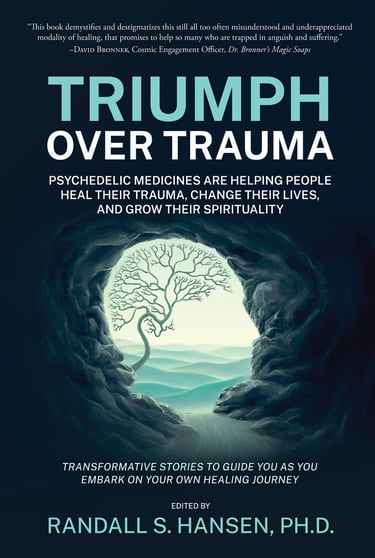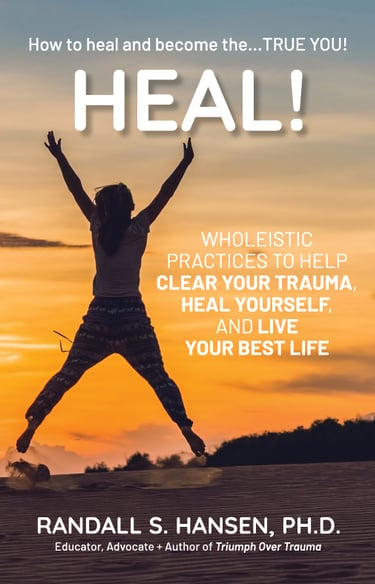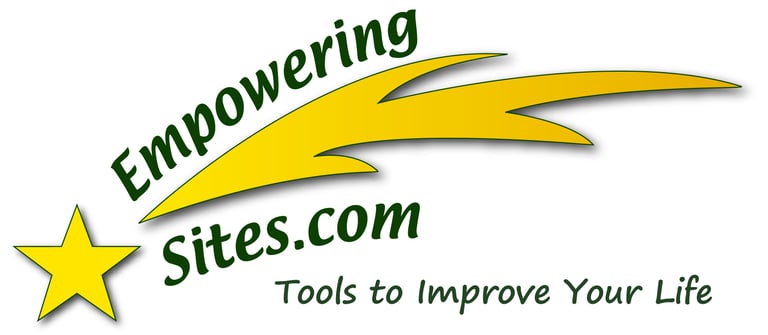The Many Faces of Trauma: Are You Ready to See Yourself?
Are you dealing with unprocessed trauma? If you live in the world and are currently breathing, you have likely experienced some level of trauma in your past. The key issue is whether you have dealt with those trauma wounds or simply pushed the pain down deeply inside you.
It’s best to think of trauma as a psychic wound, hurt, or defeat that hardens you, typically caused by a single incident or a series of negative events. Trauma is not what happened to you, but the emotional response to something that you experienced. (Interestingly, trauma is derived from the Greek word for “wound.”)
We may think we have put our trauma “in the past,” but all trauma leaves traces within us, regardless of how well we think we have dealt with the issues. Unaddressed trauma can literally change the structure of our brains.
What are some examples of trauma that people experience?
Natural disaster/pandemic
Social isolation
Accidents/Fires
Disabilities
Bullying
Abusive relationships
Sexual trauma
Violence/War
Surgery/Medical procedures
Death/Grief
Reproductive trauma
Racial discrimination/oppression
Gender discrimination/oppression
Abandonment/Neglect
Terrorism
Past trauma — of all types — stays with us. It is stored as compressed survival energy until we can find a way of truly clearing it, not simply masking the symptoms. Untreated trauma leads to a myriad of health and emotional issues, at times robbing us of joy, love, and intimacy, as well as affecting our immune systems.
Most people carry too much pain from past trauma with them — and they continue to carry that trauma in their minds, bodies, and souls long after the traumatic event, which leads to both mental and physical health issues — and more pain, including:
Post-traumatic stress
Nightmares
Depression
Anxiety
Self-harm
Suicidal ideation
Substance abuse
Sexual dysfunction
Relationship/trust issues
Health problems
The good news is that you can work through your past trauma during a healing journey whose goal is to safely walk you through your past, face the repressed feeling and emotions, and move forward understanding that these past experiences were not your fault and that you are entitled to live a life free from a nagging/disturbing trauma.
But to find healing, you first need to face yourself, face your past, and move toward your future.
The 20 Faces of Trauma
If you are serious about finding healing – and we all should be – please review these typical responses to trauma to see if you see yourself in one of these people.
Angry Andy: Flies off the handle at the smallest sense of injustice or slighting.
Anxious Arthur: Has severe feelings of inadequacy, inferiority, and worry.
Apologizing Amy: People-pleaser, apologizing for anything and everything to avoid conflict.
Avoidance Anthony: Will do whatever it takes not to face any potentially negative situation.
Clownful Charlie: Uses humor to deflect and avoid discussing painful topics.
Critical Cate: Beats herself up about the trauma, as well as her reaction to being upset.
Daring Dan: Always ready to gamble, take serious risks, to show false courage.
Fearful Felicia: Cowering, hiding, and living too often in flight-or-fight mode.
Flinching Fred: Recoils, cringes, and jumps at unexpected sounds and voices.
Guilty Gus: Accepts and places the blame on himself for his trauma. Survivor guilt.
Hoarding Harry: Places great emotional attachment to things over everything else.
Intellectual Ian: Rationalizes to explain past trauma to avoid having feelings.
Isolating Isabella: Creates a sheltered and secluded environment in which to live.
Numb Nancy: Shuts down most emotions to avoid having any intense feelings.
Paranoid Paul: Always expecting danger and threats, to the point of delusion and irrationality.
Shameful Sam: Responds to certain situations with embarrassment or humiliation.
Sleepless Stephanie: Experiencing nightmares and long periods of restless sleep.
Storm-chaser Sandy: Creates her own drama or crisis when things are too calm.
Toxic Terry: Seething with slow-burning emotions, spewing hate.
Workaholic Wes: Uses working long and hard hours as a tool of avoidance.
How We Heal From Past Trauma
Unfortunately, without healing, no one can escape the torture of our psyche’s attempt to find fault, raise doubts, question our motivations, challenge our ideas of love and happiness, and be our own harshest critic… and even inflict physical pain.
To truly heal, you need to understand that past traumas can impact every system within your body, and that the ONLY way to truly heal is to clear that trauma, not simply mask the symptoms. To live our authentic lives — lives filled more with hope and love — we need to HEAL.
While there are many ways to seek understanding and healing, in my book, HEAL!, I outlined the six major tools for holistic healing. I call them wholeistic tools because they are proven methods that will help you become whole again, free of the emotional (and physical) baggage.
1. Nature. Without question, spending time in nature is healing. In fact, the Japanese have a term for relaxing in nature -- shinrin-yoku -- which means "forest bathing." It involves opening the senses to the woody aroma of the trees and other plants, the green scenery, and the soothing sounds of streams and waterfalls... because all of these elements play a part in promoting better health and healing.
Simply being in nature induces a state of physiologic relaxation, a true stress-reducer.
Furthermore, a large body of scientific evidence shows that spending time in nature is responsible for many measurable beneficial changes in the body. One of the reasons for these changes are chemicals produced by trees and plants.
2. Spirituality: Prayer/Meditation/Mindfulness. Without question, "we are spiritual beings -- having a human experience," per the powerful words from the French philosopher, Pierre Teilhard de Chardin.
Deep in our hearts, we know there is something more to us, to the world, to the universe than just our physical bodies. (And if you ever do a deep psychedelic journey, you'll understand this concept even more.)
Spirituality and its related practices can be quite a positive force for healing, especially at a time when so many of us feel disconnected from the people and world around us. More than 3,000 studies indicate that religion and spirituality have a potentially beneficial effect on health, and health is a vital part of healing.
3. Somatic/Body. There are two key elements within this healing element -- specific body movements to help promote healing and the daily exercise that is important to maintaining good health and to stimulate healing.
The term somatic comes from the Greek word soma, which means "body."
Many experts theorize that trauma affects our whole body, not just our mind. Thus, this area of healing operates on the concept that what happens to you in your life is stored not only in your mind, but also in your body -- and so you need to clear the trauma from your whole system.
4. Breathwork. There's transformative power in performing various breathing exercises, including the ability to alter your consciousness for healing. People often perform breathwork to improve mental, physical, and spiritual well-being.
Many people find the idea of breathwork odd since breathing is one of those automatic functions (along with our heartbeat and digestion). Breathing is handled by a subconscious part of the brain called the medulla, which automatically controls our breathing as well as our heart rate and blood pressure.
At its core, breathwork is about taking control of our breathing, and is designed to bring a focus to our breathing, helping to calm our stress levels, lower blood pressure, and bring balance to our bodies.
5. Psychedelics. Perhaps the greatest advancement in healing in modern times, though indigenous and native cultures have been using psychedelic plants and fungi for thousands of years. While you may be vaguely aware of psychedelics (and especially LSD) from the War on Drugs and the incredible amount of lies and propaganda, I can assure you these substances are indeed medicines for TRUE healing.
As I discussed in detail in my book, Triumph Over Trauma, these psychedelic substances are being labeled a "breakthrough" medicine, even though they have been around for centuries. Interestingly, psychedelics were being researched and touted as miracle drugs back in the 1960s -- when many therapists used psychedelics as a tool in therapy (before all psychedelics were banned in the early 1970s).
6. Nutrition. Whether you believe your body is a temple or simply that we only have one body so we should treat it as best as we can, the result should be the same: a focus on eating healthy, nutrient-dense foods.
Instead, the diets for many of us involve too many meals consisting of low-quality, convenient fast-foods or ultra-processed foods from the local grocery store or Walmart or pizza joint.
The solution that I discuss in The Healing Revolution Diet is to flip the script and to stop using these unhealthy foods as “comfort foods” and instead change your diet to one of real foods of the highest quality.
Final Thoughts on the Faces of Past Trauma
We can’t do a whole lot to fully protect ourselves or our children from trauma because we know that hurt people hurt people, but we can do a lot to not let past trauma steal our lives, our livelihood, our future.
If you thought you had never experienced trauma, but see yourself in one or more of these typical trauma reactions, please seek healing.
We all deserve to live our best, healed, and healthiest lives. Please start healing TODAY!
Please go to my website, RandallSHansen.com, for many more tools and resources to help you on your health and healing journey.
Dr. Randall Hansen is an evangelist, educator, and thought-leader... helping the world heal from past trauma and the poor food system. He is founder and CEO of EmpoweringSites.com, a network of empowering and transformative Websites, including EmpoweringAdvice.com.
He is the author of the groundbreaking Triumph Over Trauma: Psychedelic Medicines are Helping People Heal Their Trauma, Change Their Lives, and Grow Their Spirituality and the well-received HEAL! Wholeistic Practices to Help Clear Your Trauma, Heal Yourself, and Live Your Best Life.
The third book in the Wholeistic Healing Trilogy is the game-changing The HEALing Revolution Diet: A Science-based Approach to Heal Your Gut, Reverse Chronic Illnesses, Lose Weight, Clear Your Mind, and Increase Longevity.
Dr. Hansen's focus and advocacy center around true health and healing journeys that results in being able to live an authentic life filled with peace, joy, love. Learn more by visiting his personal Website, RandallSHansen.com. You can also check out Dr. Randall Hansen on LinkedIn.








